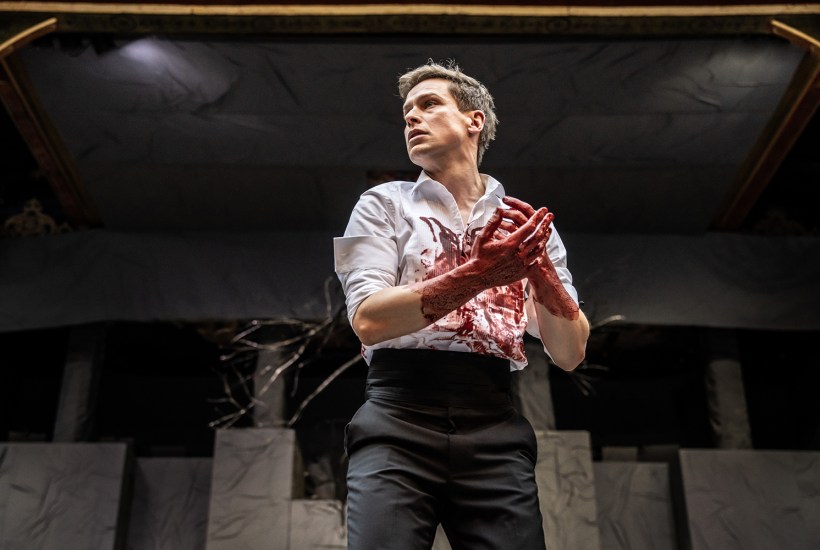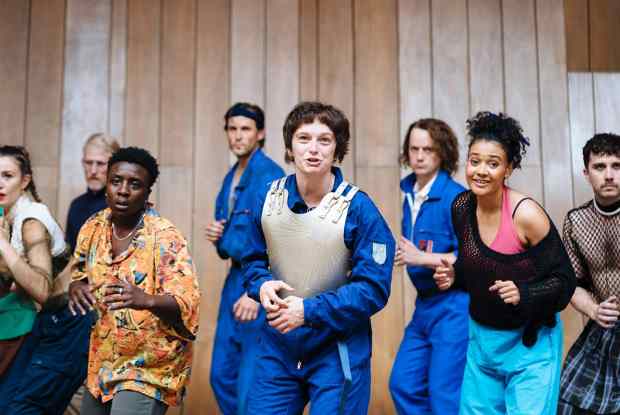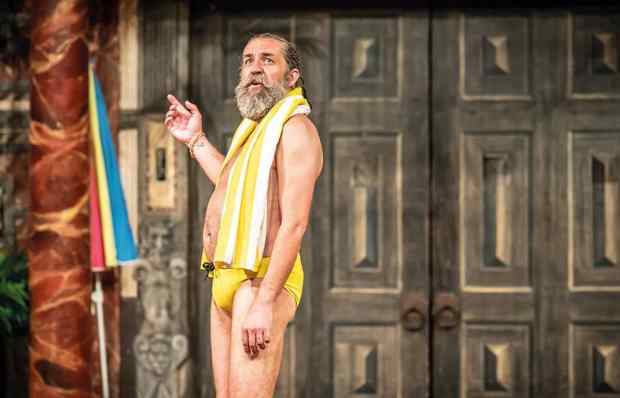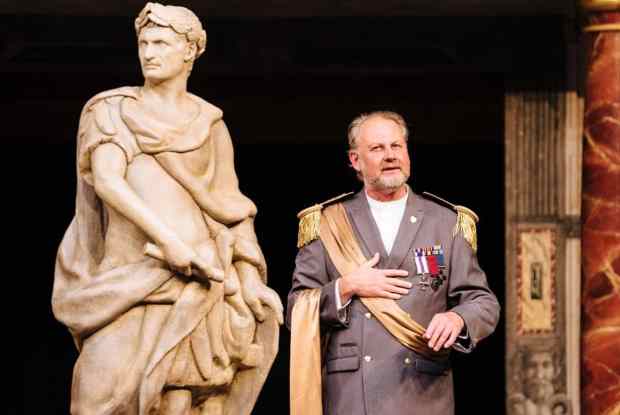Macbeth at the Globe wants to put us at our ease and make us feel comfortable with the play’s arcane world of ghouls, hallucinations and murderous prophecies. Abigail Graham’s up-to-the-minute production offers a few nods to history, like the eagle masks worn by the three witches, but for some reason they speak in dense cockney accents and wear biohazard suits. And they’re all men. The Scottish soldiery favour black body armour like SAS recruits or Metropolitan Police officers. And King Duncan, benefitting from equality legislation, has been transformed into an alpha female: ‘Queen Duncan’, as everyone calls her. She strides on to the battlefield in the opening scene sporting a beautiful cream trouser suit and a salon-perfect ash-blonde hairdo. A puzzling costume for a tribal leader who just spent the day hacking her enemies to pieces with a longsword and a flanged mace.
And it may be incorrect to assume that the early medieval period is too difficult for a modern audience to grasp. The Jacobeans who witnessed the first performance in 1606 were more remote in time from the historic Macbeth (born circa 1005) than we are from the Jacobeans. And if unlettered Londoners in the 17th century could understand history, we should try to emulate them.
But this production won’t let us. The show unfolds like a backstage bitch fight between a group of middle managers at a corporate awards ceremony. When Duncan retreats to Macbeth’s castle, the courtiers tear off their battle fatigues and climb into formal evening wear. The men look trim in their tuxedos and shiny black shoes while the women swish about in designer frocks and stilettos. The visual details jar constantly with Shakespeare’s storyline which requires the characters to commit murders with blades, like teenage thugs. Macbeth looks as slick as James Bond but he can’t kill Duncan with a Walther PPK so he uses a kitchen chopper instead, and he manages to spill a jar of blackcurrant juice all over his dress shirt while he does so. It’s hard to reconcile these inconsistencies with the narrative.
What’s really missing is the play’s essence: the air of mystery, foreboding, evil, darkness. The Macbeths’ touchy-feely relationship looks very off-kilter. A gap of some years separates the athletically handsome Max Bennett from Matti Houghton’s Lady Macbeth who seems to pay little attention to her appearance. We first meet her as she slobs around the castle in an oversized T-shirt and a pair of saggy tracksuit bottoms like a stressed-out A&E nurse. How did this overworked skivvy nab a husband who looks like Norway’s Olympic pole-vault champion? He’s all Sloane Square, she’s all car-boot sale. And her lines are often obscured by a quartet of warblers in the gallery who croon melodies during her finest speeches. It’s very galling for an actor to have to compete against a blaring choir as well as the fidgeting crowd, the circling pigeons, the police helicopters churning overhead and the distant moan of the Thames Clipper. Hardly a classic.
God of Carnage by Yasmina Reza is the play that everyone wishes Harold Pinter had written. He once described his subject as ‘the weasel under the cocktail cabinet’ but he later disavowed the phrase which he considered a trap. Reza’s play brings the Pinteresque mustelid to life.
Structurally the script is a marvel, as stark and simple as a pyramid, and yet it concerns an everyday tussle between middle-class neighbours. Two boys, aged 11, have had a fight that has left one of them with a missing tooth and a swollen lip. The four parents meet to finalise a joint statement which concludes that the more aggressive lad was ‘armed’ with a stick. Armed? The father, a corporate lawyer, takes exception and suggests ‘equipped’ instead. His substitution is adopted immediately. All the parents are keen to parade their good manners and sophistication even though they secretly mistrust and detest each other. Of course they find it wonderfully easy to conceal their real feelings behind the flim-flam of bourgeois hospitality. They share cups of coffee and homemade cake and they offer trite observations about each other’s careers and hobbies. In other words, they behave exactly like you and me.
But gradually, through the fog of pleasantries, their loathing starts to assert itself and an open war breaks out. First the partners go head-to-head like a mixed-doubles tennis match. Then the marriages fracture internally to reveal emotional difficulties that may or may not prove terminal. It makes for joyful, thrilling and punishingly hilarious theatre.
Nicholai La Barrie’s production is distinguished by superb performances and an eye-catching set from Lily Arnold. Beautiful rugs and side pieces. Two white sofas, one of them backless. A few simple but stylish accessories and the entire apartment unified by a pattern of dynamic concentric circles. Even if you don’t like the play, you’ll want to steal the furniture.
Got something to add? Join the discussion and comment below.
Get 10 issues for just $10
Subscribe to The Spectator Australia today for the next 10 magazine issues, plus full online access, for just $10.
You might disagree with half of it, but you’ll enjoy reading all of it. Try your first month for free, then just $2 a week for the remainder of your first year.














Comments
Don't miss out
Join the conversation with other Spectator Australia readers. Subscribe to leave a comment.
SUBSCRIBEAlready a subscriber? Log in